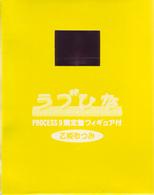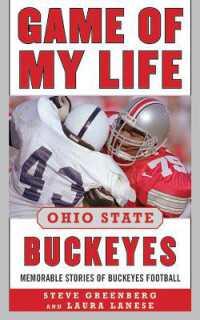- ホーム
- > 洋書
- > 英文書
- > Philosophy
基本説明
Defends a novel version of the Leibnizian cosmological argument.
Full Description
An expansive, yet succinct, analysis of the Philosophy of Religion - from metaphysics through theology. Organized into two sections, the text first examines truths concerning what is possible and what is necessary. These chapters lay the foundation for the book's second part - the search for a metaphysical framework that permits the possibility of an ultimate explanation that is correct and complete.
A cutting-edge scholarly work which engages with the traditional metaphysician's quest for a true ultimate explanation of the most general features of the world we inhabit
Develops an original view concerning the epistemology and metaphysics of modality, or truths concerning what is possible or necessary
Applies this framework to a re-examination of the cosmological argument for theism
Defends a novel version of the Leibnizian cosmological argument
Contents
Preface ix Part I The Explanatory Role of Necessity 1
1. Modality and Explanation 3
Relative and Absolute Necessity 3
Scientifi cally Established Necessities 5
An Epistemological Worry about Modality: Causal Contact with Modal Facts 7
Modal Nihilism 10
Modal Reductionism and Defl ationism 15
Modal Anti-Realism and Quasi-Realism 27
Conclusion 30
2. Modal Knowledge 32
Conceivability As Our Guide? 32
Modality a Matter of Principle? 36
The Theoretical Roles of Modal Claims: Towards a Modal Epistemology 41
The Spheres of Possibility 60
Part II The Necessary Shape of Contingency 63
3. Ultimate Explanation and Necessary Being: The Existence Stage of the Cosmological Argument 65
Necessary Being 68
Two Objections to the Traditional Answer 73
Necessary Being As the Explanatory Ground of Contingency? 79
4. The Identifi cation Stage 86
From Necessary Being to God, I: Transcendent, Not Immanent 86
Two Models of Transcendent Necessary Being: Logos and Chaos 93
Varieties of Chaos 93
Interlude: The Fine-Tuning Argument 97
From Necessary Being to God, II: Logos, Not Random Chaos 109
5. The Scope of Contingency 111
How Many Universes Would Perfection Realize? 111
Perfection and Freedom 121
Some Applications of the Many-Universe-Creation Hypothesis 122
Necessary Being and the Scope of Possibility 125
Necessary Being and the Many Necessary Truths 128
6. The God of Abraham, Isaac, and Anselm? 130
The Unity of the Divine Nature and Its Consequences 132
Natural Theology in the Understanding of Revealed Theology 140
Coda 143
Notes 145
Bibliography 162
Index 172








